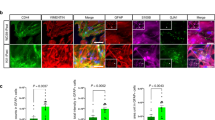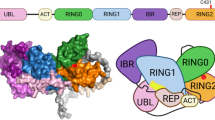Abstract
Rats harboring the agu mutation have altered behavior1 and brain pathology1 resembling human Parkinsonian syndromes2; notably, they have a movement disorder and age-progressive dysfunction and death of neurons in the midbrain (substantia nigra pars compacta) that use dopamine as a neurotransmitter. We present evidence that this phenotype is due to a mutation in the rat protein kinase Cγ (in rat, Prkcg; in mouse, Prkcc; in human, PRKCG) gene, which generates a premature stop codon, drastically reducing the level of synthesis of the catalytic domain of the brain-specific protein kinase Cγ protein.


Similar content being viewed by others
Accession codes
References
Payne, A. P. et al. J. Anat. 196, 629–633 (2000).
Lang, A. E. & Lozano, A. M. N. Engl. J. Med. 339, 1044–1053 (1998).
Serikawa, T. et al. Genetics 131, 701–721 (1992).
Hashimoto, T. et al. J. Neurosci. 8, 1678–1683 (1988).
Saito, N., Kikkawa, U., Nishizuka, Y. & Tanaka, C. J. Neurosci. 8, 369–382 (1988).
Hug, H. & Sarre, T. F. Biochem. J. 291, 329–343 (1993).
Sutton, R. B., Davletov, B. A., Berghuis, A. M., Südhof, T. C. & Sprang, S. R. Cell 80, 929–938 (1995).
Tanaka, C. & Nishizuka, Y. Annu. Rev. Neurosci. 17, 551–567 (1994).
Zirpel, L., Lippe, W. R. & Rubel, E. W. J. Neurophysiol. 79, 2288–2302 (1998).
Polymeropoulos, M. H. Ann. NY Acad. Sci. 920, 28–32 (2000).
Jaken, S. & Parker, P. J. Bioessays 22, 245–254 (2000).
Acknowledgements
This work was supported by the Medical Research Council, the Parkinson's Disease Society, the Robertson Trust and Neuropa. N.J.C, M.B.D.A. and M.C. were recipients of BBSRC studentships, and A.S.M was a recipient of an MRC HGMP studentship. The work was approved by the University of Glasgow Ethical Review Committee and by the UK Home Office.
Author information
Authors and Affiliations
Corresponding author
Rights and permissions
About this article
Cite this article
Craig, N., Durán Alonso, M., Hawker, K. et al. A candidate gene for human neurodegenerative disorders: a rat PKCγ mutation causes a Parkinsonian syndrome. Nat Neurosci 4, 1061–1062 (2001). https://doi.org/10.1038/nn740
Received:
Accepted:
Published:
Issue Date:
DOI: https://doi.org/10.1038/nn740
- Springer Nature America, Inc.
This article is cited by
-
Animal models of human genetic diseases: do they need to be faithful to be useful?
Molecular Genetics and Genomics (2011)
-
The genetics of Parkinson’s disease
Current Neurology and Neuroscience Reports (2002)





